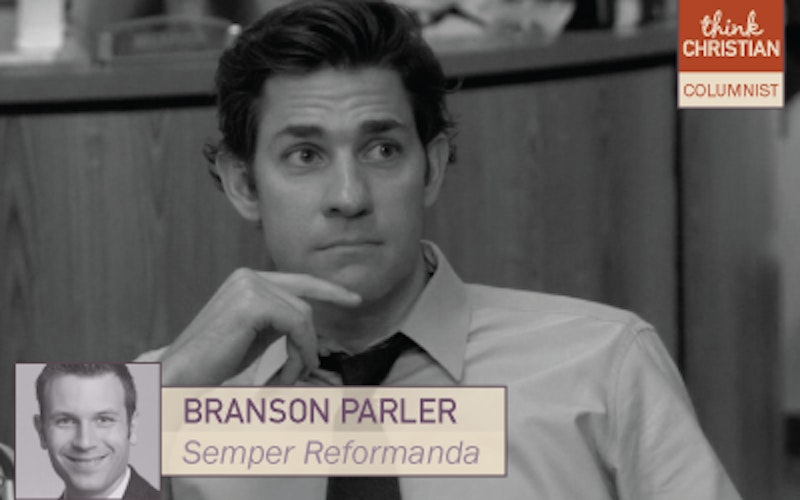
TV
Jim Halpert’s model of male headship
The Officeis well past its prime, but tonight’s series finale has longtime (and long-suffering) fans like me lamenting the end, even if the end may be a bit overdue. Although the show struggled in the wake of Steve Carell’s departure, this final season has been the best since Carell left the show.
One of the main storylines has been the marital struggles of Jim (John Krasinski) and Pam (Jenna Fischer), brought on largely by Jim’s pursuit of his dream job at a sports-marketing company in Philadelphia. Although still working part-time at Dunder Mifflin, Jim’s time and energy are focused at his other job. With only a couple of episodes to go, however, Jim decided to drop his Philadelphia job and return to full-time work as a paper salesman, thus reinvigorating his relationship with Pam. In watching these last few episodes unfold, I’ve become convinced that we should think more about what Jim Halpert can teach us.
I often cringe when I hear some Christians arguing that a married woman’s highest calling is her marriage and family, while often implicitly assuming that a married man’s highest calling is his career (because he’s the “breadwinner”). Maybe it really is impossible for women to have it all - to be a good wife and mother and also be a top professional in certain fields. But if so, we need to admit in all honesty that it’s equally impossible for men to have it all - to be a good husband and father and also be a top professional in certain fields. But for the most part, we’ve assumed that it’s acceptable for men to sacrifice marriage and family for career. Christian men need to stop making that assumption and count the cost of having the mindset of Christ.
If our vocation, or calling, is to seek first the kingdom of God, it may be that we can do that best in a job that doesn’t really excite us.
Jim’s predicament also helps us think about reducing the idea of vocation to one’s employment. If our vocation, or calling, is to seek first the kingdom of God, it may be that we can do that best in a job that doesn’t really excite us and isn’t really “culture-making” in any robust sense. It may be that your work is simply making the best of a boring, not-very-fulfilling job. But if that job allows you to be fully present to your spouse and children (not to mention your church and neighborhood), then that job may be more in line with the kingdom of God than the most fulfilling, innovative, culture-making job that sucks up all your time and energy.
Jim is a perfect example of this. Since he’s turned his back on the job in Philadelphia, Jim is himself again: not only is his marriage better, but he’s someone who brings life, energy and care for co-workers into an office that really needs him. It wasn’t just that Pam wanted and needed the old Jim back; the whole office needed the old Jim back (not to mention that I wanted the old Jim back).
Jim’s decision might even give us a picture of what Biblical “headship” looks like. (I put “headship” in scare quotes to remind us that we often use that term based on cultural assumptions instead of the Biblical text.) When Paul actually describes what male headship is, he lists several elements: 1) love your wife as Christ loves the church 2) love your wife as your own body, which means 3) nourishing and cherishing your wife. That’s it. Nothing more, nothing less. By putting his marriage and his wife before his own career ambitions and desires, Jim gives us a glimpse of what real headship might actually look like and what it means to “submit to one another.” In this way, Jim gives a glimpse of the Christological truth that in giving our self away, we receive our true self. Nowhere is this more true and more difficult than within marriage.
Topics: TV, Culture At Large, Arts & Leisure, Home & Family, Family, Marriage